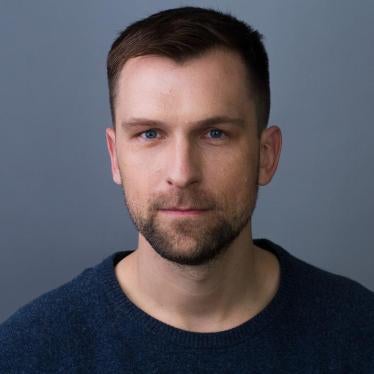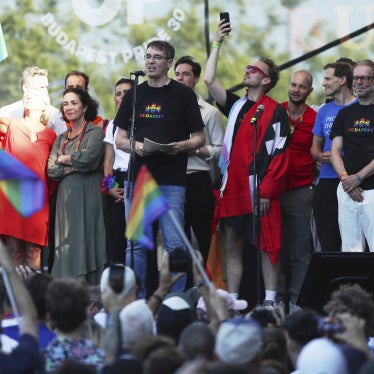The climate in Kazakhstan is so hostile to LGBT people, there is not a single active registered group.
I had been told Oleg, 29, was the de facto leader of the local LGBT community, but he didn’t want any attention to that role or work.
Almaty, the bustling southern city that is Kazakhstan’s former capital, is contending to host the 2022 Winter Olympics, with the vote on Friday. The only other contender is Beijing. Both countries have serious human rights problems, but in the process of bidding for the Olympics, Kazakhstan’s parliament moved to adopt anti-gay “propaganda” legislation that would have directly contravened the Olympic Charter’s rule that discrimination is incompatible with the Olympic Movement. The legislation was not signed into law, but as a sign of the chilling climate for the gay community in Kazakhstan, a member of parliament has already proposed reintroducing it.
While I and my interpreter ate, Oleg drifted between tables, stalling at mine to answer questions quietly. For three years he had run a secret gay night club, rotating venues to avoid attention. Almost nightly, gay and transgender people would show up bearing bruises and asking for cash and help. Some needed to pay medical bills to treat injuries they had suffered at the hands of attackers; others wanted advice how to flee abusive families.
“I let some people sleep on the club floor, some came and slept on the floor of my flat,” he said. I asked if he ever had help. “We all helped each other. There is no space for an actual community except in secret. But we had a moral community – without that we would have all fallen apart.”
While I was interviewing Oleg, draft legislation against “propaganda of non-traditional sexual orientation” was under consideration in Kazakhstan, a bill promoted under the guise of protecting children from “harmful information” about homosexuality akin to the ugly “gay propaganda” law Russia had passed in 2013.
During my time in Kazakhstan I met LGBT people who, resilient amid a climate of intense homophobia, felt fear and trepidation in the face of the pending legislation.
A woman raising a teenage daughter in Astana, the capital, described her exhaustion at trying to counter the tide of anti-LGBT rhetoric her child hears every day, while in Almaty, Kazakhstan’s cultural capital and 2022 Olympics candidate, a young lesbian mother explained: “The problem is that we start to believe these nasty things about ourselves because there’s no counter-argument in public.”
A 28-year old lesbian I spoke with argued that the looming law was “about giving sanction to the homophobia that is already everywhere around us. We feel it constantly, this law would just put it on paper.”
Oleg returned to our table periodically for nearly two hours, telling me stories of people he had met and helped. There was the 17-year-old who came out to his parents and then had his father chase him out of the house with a screw driver, threatening to kill him. There was the transgender woman who worked as the club’s dancer who suffered “dozens” of attacks at the hands of men in her neighbourhood. Others told him of persistent, intense fears of their sexual orientation being disclosed at home, school, or work.
Oleg spoke modestly about his social work – it was, he said, his role in the beleaguered ‘moral community.’ But last year he had to shut the club. He was broke; he said he had spent his entire income helping patrons recover from or escape violence and discrimination.
“I can make enough money at the restaurant to still help people sometimes,” Oleg said as he cleared the plates from the table. “But it’s not like it used to be – I have to say ‘no’ more often now.”
A few minutes later he told us we had to leave – people would start getting suspicious if we stayed any longer. But, he said, I could ask one final question.
I struggled with how to phrase it. “All around the world, people like you who help other people, gather money and offer advice and support to LGBT people in crisis – they call themselves activists, and they have organizations and funding,” I said. “I don’t presume to tell you what to do with your life, but I am curious: Have you ever thought about starting an organization and formalizing what you already do for others?”
“I am proud of being a gay man, and proud of helping my community.” But, he said, there was no chance an open LGBT movement could survive in Kazakhstan today. “Look at our history – we haven’t done anything to provoke them, we haven’t demanded any rights or recognition, we have just been silent and tried to survive the abuses that come our way,” he said. “And still – you can see in the parliament today that they want to call us illegal propaganda.”
In June, Kazakhstan’s Constitutional Council voided the “propaganda” bill on the grounds that it was too vaguely worded. It’s good that the legislation was stopped—for now. But there is no shortage of homophobia that could motivate others to revive it, and the government has done little to provide LGBT people protection and support like Oleg do on their own.
Hoping to win the right to host the 2022 Winter Olympics, Kazakhstan has signed a host city contract that enshrines non-discrimination, including on grounds of sexual orientation. The great test will be whether Kazakhstan will honor that pledge and allow citizens like Oleg to live without fear.








